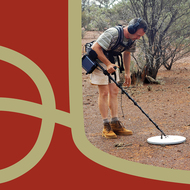Whether you have many years of experience or are relatively new to prospecting, it is vital to be prepared for the unexpected when travelling around remote areas of WA.
| Date: | Friday, 20 December 2024 |
|---|
Many prospectors may return to familiar ground each year, but the safety of yourself and others in your group must be your top priority. While you might be familiar with the area you plan to be prospecting in, you cannot anticipate a broken ankle, a snakebite, heat stroke, vehicle failure, serious bogging or other unexpected events, which may occur some distance from your camp or fellow prospectors.
An essential part of your equipment must be a Personal Locator Beacon (PLB). They are inexpensive, available at most outdoor stores, simple to use, and only when activated will send an alert to authorities who can pinpoint your position and make their way to assist you. Note that a GPS is not a PLB and does not transmit location information to emergency services.
Having a PLB on your belt or in your pack when you head out prospecting each day (and not left back at camp) may well determine the outcome of any unexpected incident, which can happen to anyone. For some prospectors in WA, it has actually been a matter of life and death.
Carrying a Personal Locator Beacon on you when prospecting goes together with other well-established safety measures such as:
- planning your prospecting locations according to your experience level and capabilities;
- letting people know where you are going and how long you expect to be away;
- having a reliable person to act as a contact at home;
- being prepared to change your plans due to last minute adverse weather or fire risks, and inform your contact person of any changes;
- leaving behind a copy of maps for the area where you intend to go - mark the roads you are likely to use and possible camping and prospecting areas;
- leaving details of the vehicles and people involved in the prospecting trip and their telephone/satphone numbers;
- use a scheduled call-in system and agree on a back-up plan if a call is missed, so it is clear when the alarm will be raised; and
- familiarising yourself with communication devices you are taking before leaving home.
Remember there is very limited mobile phone range in remote locations and UHF radios are only short range. Satphones can be rented for the duration of your trip, and increasingly, other satellite-based systems are available which can send pre-prepared messages and can also be tracked.
Also remember that if there is an emergency requiring immediate action, your home contact may not know of your situation for some time and will not know exactly where you are. Once activated, the PLB will immediately send your exact location for emergency services to assist you.
For further advice: Put safety first.

